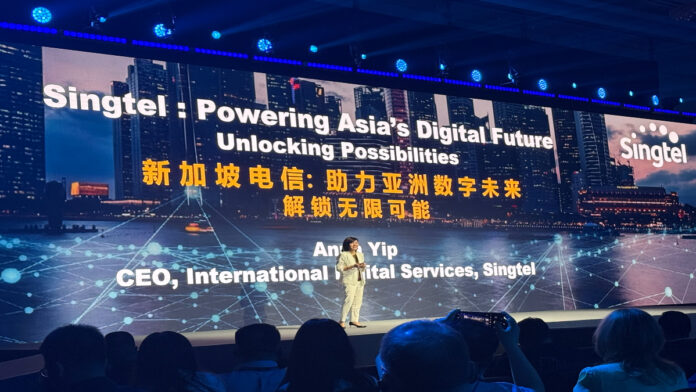Singtel has commercially deployed 5G network slicing at major events and is extending use cases to healthcare, ports and security
In sum – what to know:
5G network slicing at scale – Singtel has commercially deployed network slicing across events like the National Day Parade and F1, and is exploring healthcare uses such as smart ambulances and remote monitoring.
AI-driven telco transformation – Singtel aims to make 100% of its workforce AI-ready, with 25% trained as AI practitioners, while leveraging AI for cybersecurity, customer care and new business models.
Global innovation sandbox – Through partnerships with Hyundai, Changi Airport, and PSA, Singtel is positioning Singapore as an innovation hub, supported by its 5G+ rollout.
SHANGHAI—Singaporean telco Singtel is accelerating Singapore’s role as a global testbed for digital innovation by embedding artificial intelligence (AI) across its operations and launching advanced 5G network slicing across key industries, said Anna Yip, CEO of international digital services, during her keynote session at MWC Shanghai 2025.
Singtel has commercially deployed 5G network slicing at major events and is extending use cases to healthcare, ports and security, she added.
Meanwhile, AI is being embedded into Singtel’s operations, customer care and business models, with a goal to train 100% of staff and create AI practitioners, Yip added.
Yip emphasized that the telco is now driving the next wave of digital transformation in the region through the twin engines of AI and 5G.
The Asian operator began its 5G journey in 2021 and has already used network slicing commercially at major events including the National Day Parade, Formula 1 races and large-scale concerts. “We have been doing network slicing… with devices, with apps and now with particular user groups,” Yip said. Powered by 5G+, these capabilities are supporting complex and mission-critical use cases across multiple industries.
At Changi Airport, Singtel has enabled autonomous baggage handling, high-definition aircraft inspections and predictive takeoff timing. “We are also doing that to protect staff safety… to reduce their exposure to harsh weather conditions,” Yip noted.
Healthcare is another focus. In this area, Singtel partnered with National University Health Systems to deploy a private 5G network that enables real-time data analytics and mixed-reality surgical planning.
Yip also unveiled a company-wide AI roadmap structured around the “four E’s”: Empower, Excellence, Endear, and Enable. The goal is to ensure 100% of employees receive AI training, with 25% becoming AI practitioners and 5% certified AI specialists. “We want everybody to embrace this new technology,” she said, adding that AI governance frameworks with fairness and transparency are being implemented.
On the consumer side, the executive highlighted that AI is behind new customer protection tools. “In the past two years, we have been using network slicing to put security as a network slice,” she explained. Through its mobile protect offering, Singtel now filters more than 6 million malicious sites per month using AI.
The Asian carrier is also using AI to reshape its business model. A newly formed travel alliance with eight telcos leverages mobility data and AI to personalize travel experiences. “We want to reward [travelers] with truly new value-added services,” Yip said, citing itinerary creation, emergency assistance and retail offers.
Finally, the executive stressed that Singtel is part of the Global Telco AI Alliance (GTAA), which is developing practical use cases with multilingual large language models (LLMs) tailored to the telecommunications sector. Yip described it as “cross-border cooperation” to accelerate sector-wide transformation.
“For us, the journey of AI is just starting,” she said. “Singtel is committed to powering the digital future of Asia by continuously innovating and embracing AI as a core part of our strategy.”

